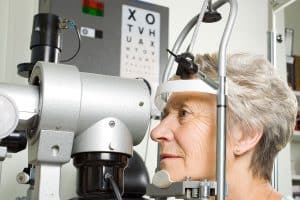
According to the World Health Organization, cataracts are a leading cause of blindness globally. In context, more than 2.2 billion people have a near or distance vision impairment worldwide. In at least 1 billion, vision impairment could have been prevented or has yet to be addressed; this includes those with moderate or severe distance vision impairment or blindness due to:
- Unaddressed refractive error (88.4 million)
- Cataract (94 million)
- Age-related macular degeneration (8 million)
- Glaucoma (7.7 million)
- Diabetic retinopathy (3.9 million)
- Near vision impairment caused by unaddressed presbyopia (826 million)
- Other conditions
More people lose vision due to cataracts than almost any other reason (the exception being refractive errors like nearsightedness and farsightedness). The impacts of vision loss and blindness are often devastating — affecting a person both personally and professionally.
Laser Eye Center, located in Southern California and serving patients locally, regionally, nationally, and beyond, has made it our mission to protect you from vision loss and blindness due to cataracts. When you seek cataract care from our team, not only can you overcome cataracts, but you might achieve the best vision you have ever had in your life!
How Cataracts Impair Vision and Lead To Blindness
If you are not already familiar with the anatomy of a cataract, it is vital to understand exactly how it affects visual processing. Cataracts affect the lens of your eye, which along with the cornea helps focus incoming light rays.
Your lens is normally transparent and made up of various proteins. These proteins can deteriorate and group together, forming opaque areas that block light from properly entering the eye and focusing on the retina. (The vast majority of the time, this happens due to the cumulative effects of age; but some cataracts are congenital or develop because of other factors.) As a result, the clarity of your vision gradually worsens.
Cataracts are a progressive disease, and they usually take years if not decades to develop. But left untreated, a very advanced or “mature” cataract can cause blindness. Cataract-induced blindness can be partial, meaning very limited vision (i.e., colors and shapes can be seen, but not much else), or it can be total blindness, meaning the inability to see anything.
Blindness can take away your ability to read, drive, work, and do household chores. It can force you to become reliant on a spouse, family member, or caretaker to stay safe. Fortunately, blindness due to cataracts is completely avoidable as long as certain precautions are taken.
How Long Does It Take To Go Blind From Cataracts?
The timeline from the onset of a cataract to going blind is different for everyone. It largely depends on the speed at which the cataract develops.

In a typical age-related cataract, the physiological changes within the lens start to set in around the age of 40. At this point, the proteins that compose the lens begin to break down; subsequently, they clump together and form hazy areas over the normally transparent lens. This process happens very gradually. It usually isn’t until after the age of 60 that cataracts noticeably impair vision.
Some factors can accelerate the development of an age-related cataract or trigger the formation of an early-onset cataract. These factors include the following:
- Smoking
- Consuming excessive amounts of alcohol
- Prolonged periods of unprotected exposure to UV light
- Underlying illnesses such as diabetes
- The long-term use of corticosteroid medications
- An injury to the eye
- Obesity
- Nutritionally deficient diet
- Eye surgery
- Radiation treatment
- Family history of cataracts
Congenital cataracts are also possible (but rare). Some babies are born with cataracts in one or both eyes.
Avoiding Blindness Due to Cataracts
The easiest time to treat cataracts is before you lose your precious sight. This way, you can continue to enjoy your active, independent lifestyle without interruption.
Early Detection
Ideally, you see your eye doctor annually for a complete visual exam, which checks for signs of cataracts. If you are not already in the routine of annual eye exams, there is no better time to start than now. Eye doctors at Laser Eye Center are specifically trained in the detection of signs of cataracts and know exactly what to look for.
It also helps to know the subtle signs that suggest that your vision is deteriorating due to cataracts. For example, cataracts make it more difficult to read or perform up-close tasks in low-light conditions. If you find yourself constantly adjusting the lighting in your home, vision impairment due to cataracts could be to blame. Similarly, visual decline induced by cataracts can cause frequent fluctuations in eyeglasses or contacts prescription. Should you experience any of these troubles in your everyday life, book an eye exam with your doctor as soon as possible to confirm or rule out cataracts.
Follow Your Eye Doctor’s Recommendations

If your doctor determines you do indeed have cataracts, he or she will recommend the most suitable course of action. Mature cataracts usually require prompt surgical removal. But many early cataracts do not need immediate treatment. Your doctor may recommend a “wait and watch” approach if your cataracts are in the early, less-serious stages. In this scenario, your eyes and vision are closely monitored over time. If or when the cataract matures to the point that it badly interferes with your vision, it becomes time to seriously consider removal.
Find Reliable Care for Cataracts
When the time comes to have a cataract removed, you owe it to yourself to seek out a reputable provider. With locations all over Los Angeles and the Inland Empire, Laser Eye Center provides comprehensive care for every cataract case. Our experienced cataract surgeons offer world-class technical capabilities to improve the outcomes, speed, and ease of the procedure. With brand-new, state-of-the-art intraocular lenses, you will enjoy the independent vision you need to enjoy all that life has to offer.
Avoid Going Blind to Cataracts – Call Us Today for More Information
A cataract diagnosis does not destine you to permanent vision loss. To avoid jeopardizing your vision, independence, and quality of life, stay on top of your ocular health and contact an eye doctor if you notice any concerns.
If you have already been diagnosed with cataracts, your next step is making a phone call to Laser Eye Center. We are widely respected for helping individuals such as yourself overcome cataracts with the finest technology and lens implants available on the market. We will customize a treatment solution to your needs and plan out a roadmap to clearer vision. Contact us today to request more information.
Schedule your free consult today
Click here to learn moreGet started on your journey to clearer, crisper vision with Laser Eye Center™. Our expert team of doctors are trained and skilled in the latest technology and methods for laser vision correction. To learn more about our state-of-the-art All Laser LASIK technology or about All Laser LASIK itself, contact us today. Schedule your FREE All Laser LASIK consultation by calling today.

